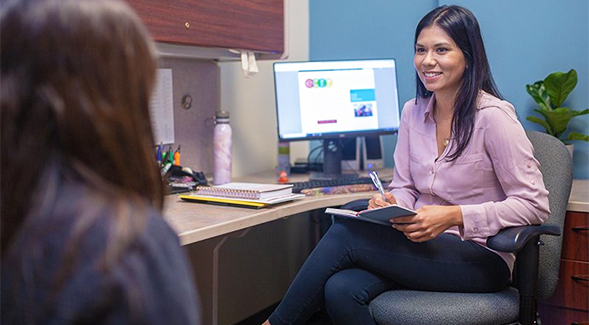Helping Students During a Crisis
SDSU is offering a helping hand to students affected by COVID-19 through its Economic Crisis Response Team.

“This school is amazing and I can’t thank everybody enough for what they have done for me.”
Toward the end of the second week in March, Chelsea Payne’s phone began ringing more than it ever had in her five months as San Diego State University Economic Crisis Response Team (ECRT) coordinator. “Usual days I would get a couple of requests for assistance,” she said, “then it went up to 15, 20, 30 people a day.”
The calls are from SDSU students cast into some form of economic uncertainty by the COVID-19 pandemic. Many, particularly service workers, lost their jobs when businesses were ordered to close indefinitely to help slow the spread of the coronavirus.
“Students ask about food resources or getting support for paying their rent with the lack of income that they’re now dealing with,” said Payne (’13, ’14). “I try to respond as quickly as I can because I want them to know there is someone here to support them.”
Keeping students in school
The ECRT was formed in 2015 and operated out of SDSU’s Office of Financial Aid and Scholarships. Since 2018, the team has been part of Student Affairs’ Well-Being and Health Promotion department.
It was created from an understanding that food and housing insecurity affect students’ academic performance. Keeping students in school and on track to graduate when they encounter such challenges greatly increases their odds for success.
RELATED: VIDEO: “We’re Going to Get Through This”
The ECRT includes 42 administrators, faculty, and staff from departments across campus who can evaluate and expedite a student’s request for assistance. Team members are well versed in campus and community resources available to meet an individual student’s needs.
According to Payne, during the entire fall 2019 semester the ECRT received approximately 230 student requests for assistance. This March alone, more than 450 requested assistance.
Associated Students, which hosts the annual Aztecs Rock Hunger food drive that contributes 20% of monetary donations to ECRT, is assisting with the volume by reassigning three student assistants trained in basic needs support who typically work to operate the food pantry to ECRT.
Burned out
A couple of calls have come from Robert Stoebe, a 31-year-old communication major from the Palmdale-Lancaster area who intends to graduate next fall. In January, he lost his house and most of his belongings in a fire after having just moved in with a group of roommates. He had no renter’s insurance.
He slept on floors and couch-surfed at friends’ places while attending classes and working nights full-time as a bar manager. “I didn’t want to get out of my classes because I had just paid for an entire semester of school,” he said. “It was definitely one of the hardest points in my life.”
Then a counselor told him about ECRT. He called and connected with Payne, who quickly found a room with a bed where he could stay until he found another place. “I was really surprised at how fast it was,” Stoebe said.
He was able to keep his studies on track while he found another house to share with three roommates. Then COVID-19 delivered another blow when restaurants and bars, including the one where he worked, were shut down.
He lost his job as did two of his roommates, all of them service workers.
A scary world
“I’m a very proud person,” Stoebe said. “I don’t like to ask for help from people, but it’s a scary world we live in right now and I feel like with what’s going on I’m just doing my best to get by.”
So for the second time, he connected with Payne. “Without hesitation, she met me the same day with a $100 gift card to Trader Joe’s and I went there and made it stretch as far as I possibly could to fill up my shelves,” he said.
Stoebe has filed for unemployment and hopes to return to his job when the coronavirus threat subsides. For now, he stays home and studies, determined to stay on track for graduation.
“I feel like all of this has brought me to a higher level of resilience,” he said. “I’ve learned that I can take on a big load and handle it.”
He is grateful to SDSU and the ECRT for helping him shoulder the load. “This school is amazing and I can’t thank everybody enough for what they have done for me,” Stoebe said.
“I don’t think other schools operate quite the way SDSU does where from top to bottom everybody is helpful and they want us to succeed. I know that if I reach out to SDSU they will try to take care of me and it’s nice to know that someone is in my corner.”
Offering assistance
Nearly $70,000 has been raised for the Economic Crisis Response Team to support SDSU students affected by COVID-19.
“Our resources are limited and right now the need definitely outweighs what we have,” said Payne. “We don’t know how long this is going to go on, so the longer we can provide resources and financial assistance or food assistance to our students there’s a little bit more stability that we are able to offer them.“
“I’m so grateful for anyone who is willing to support our program and donate any amount. For some students, $15 or $20 is what they need right now to buy some groceries and it all goes to that.”
Text "SDSU" to 20222 to donate $15 in support of SDSU's emergency crisis fund to support students in emergency situations. Donations can also be made by visiting sdsualumni.org/supportstudents.



